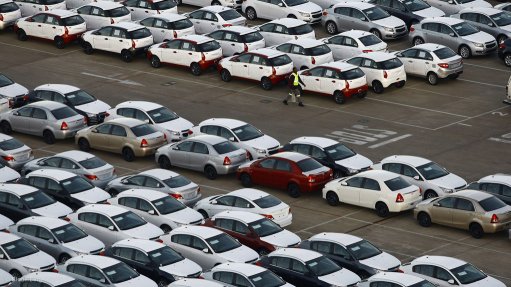
Photo by: Bloomberg
African Continental Free Trade Area (AfCFTA) secretary-general Wamkele Mene has said the automotive sector is at the heart of Africa’s industrialisation and can play a vital part in the global electric vehicle (EV) value chain once the trade regime is enacted.
As of October, 44 of the 54 signatories, or 81.5%, to the AfCFTA have deposited their instruments of ratification. Only one African Union member country, Eritrea, has not signed the agreement.
Mene spoke during the inaugural South African Auto Week event, hosted by Naamsa│Automotive Business Council from October 26 to 28, at the Kyalami Grand Prix Circuit, in Midrand.
The event aims to be catalytic for the sector and has served as a platform for numerous announcements and showcases, including Naamsa announcing its inaugural Sustainability Report will be published in November and automaker Nissan showcasing its e-power Qashqai, which uses a 140 kW electric motor to drive the wheels, and a petrol engine to generate electricity for charging the battery back or driving the electric motor directly.
The vehicle is fully electric; however, it requires no plugging in and, according to Nissan, has a longer range than any hybrid or EV on the South African market.
Naamsa will also use the event as a platform to launch its inaugural Accelerator Awards, which are set to become South Africa’s most prestigious motoring competition.
Some of the awards will include Passenger Car of the Year, New Energy Vehicle (NEV) of the Year, Top Locally Manufactured Car of the Year and Top Passenger Dealer of the Year, among the 16 awards across three categories: New Vehicle Sales, Manufacturing and Dealership.
Naamsa has already announced the nominees for the various awards and is yet to confirm when the awards ceremony will take place.
CONTINENTAL VIEW
Meanwhile, Mene stated that Africa would not reach a $7-trillion gross domestic product (GDP) by 2023 if the AfCFTA is implemented, as projected by the World Bank, compared with a current $3.4-trillion GDP, or any sort of meaningful industrialisation for that matter, without the automotive sector.
He highlighted how the continent has a unique opportunity to drive industrialisation and contribute meaningfully to global output and trade in the near future. For example, Mene pointed out that Singapore contributes 5.9% to global GDP and output, which is more than the whole of Africa combined. Particularly, Africa produces less than one-million vehicles a year.
He said that although it is not viable for all African countries to start producing vehicles, many of them have other processing capacities or potential, including rubber production capacity in Liberia, leather production capacity in Tanzania and Zambia and Democratic Republic of Congo with its copper reserves, all of which are materials or components used in vehicles and EVs or both.
Mene added that, as the world transitions to EVs, Africa can position itself to be a key supplier of materials, but not if countries do not have rules for free trade. He explained these rules enable the transit and export of goods across the African continent, and further abroad.
The AfCFTA board has identified four sectors that can grow the economy of the continent relatively quickly – agroprocessing, pharmaceuticals, logistics and automotive. It envisions that $11-billion can be added to Africa’s GDP every year, with millions of jobs created, if investment were to be focused on these four sectors.
“For every one job created in assembly of vehicles, about four are required to be created on the components’ side. This ratio presents an opportunity, and the AfCFTA’s single objective is to unleash the opportunities that can industrialise the continent and help it become globally competitive.
“We will only achieve global competitiveness if we become a single market,” Mene noted.
He believed Africa was at the point where the European Union was 72 years ago when it was first established as the European Coal and Steel Community and comprised six members. Today, it comprises 27 member States, most of which use the same official currency.
Mene emphasised the importance of market integration for global competitiveness and economic growth and was confident that African could establish a continental value chain for the automotive sector, leveraging the AfCFTA.
He further explained that the AfCFTA ushered in, for the first time in Africa, a dispute settlement mechanism that required governments to adhere to and implement rules of free trade. The AfCFTA’s instrument for resolution of trade and commercial disputes is not part of any one national government and functions independently.
“Rules of trade, and free trade overall, allow for more innovation and investment, which will enable Africa to move beyond production of less than one-million vehicles a year, and become competitive with the likes of India and China,” Mene concluded.